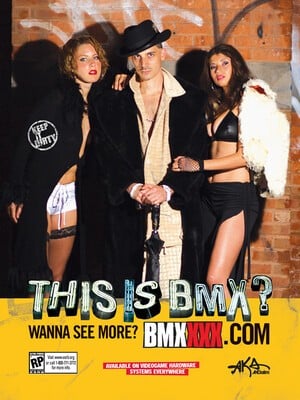
We've recently heard the news that Acclaim is back from the dead. In light of this news, we thought it might be a good idea to revisit this feature, which covers the creation of one of the company's most infamous releases. Enjoy!
Misguided, crass, even tawdry. All valid criticisms of BMX XXX, which featured the unlikely pairing of BMX riding and gratuitous nudity with a side order of fart jokes and dog sex. The game was a flop on its release in 2002 but garnered a generous helping of infamy that ensures it’s remembered even two decades on, mostly by people wondering, ‘How on earth did that game get made?’ To help answer that question, we spoke to two of the game’s developers, who reveal the story of how what should have been Dave Mirra Freestyle BMX 3 lost its star and mutated into a melange of Jackass-style humour and stripper videos.
I think that extreme sports back then had a zeitgeist moment. Tony Hawk was obviously the leader in that regard, but Dave Mirra did really well in that space
Tin Guerrero, the designer for BMX XXX, joined Z-Axis back in 1997 to work on Three Lions, the official England team football game. That game was published by Take-Two Interactive, which in turn led to Z-Axis developing Thrasher Presents Skate and Destroy for Take-Two’s brand new subsidiary, Rockstar Games. Thrasher came out at almost the same time as Tony Hawk’s Pro Skater in 1999, which signalled the beginning of a boom in 'extreme' sports games. But whereas Tony Hawk became a sales phenomenon, Thrasher fared less well, perhaps as a result of its more realistic representation of skateboarding and steep learning curve.
As a small developer for hire, Z-Axis was constantly pitching ideas to publishers, always on the lookout for the next contract. “We threw together a guy on a bike riding around on some ramps and pitched it around to people, and Acclaim jumped on it,” recalls Guerrero. “And that led to Dave Mirra Freestyle BMX,” says Glen Egan, who was the project manager of the game at Z-Axis. “That did tremendously well. I think that extreme sports back then had a zeitgeist moment. Tony Hawk was obviously the leader in that regard, but Dave Mirra did really well in that space.” Dave Mirra Freestyle BMX was released for the PlayStation in 2000, and was followed by Dave Mirra Freestyle BMX: Maximum Remix and Dave Mirra Freestyle BMX 2 in 2001. Guerrero says that the combined sales of Dave Mirra 1 and 2 were around 2.4 million – a massive figure for the time.
Extreme sports were everywhere at the turn of the millennium. “The 1999, 2000 and 2001 X-Games were huge, in America at least,” says Guerrero. “You could see it just rising and rising and rising.” And the developers at Z-Axis were just as enthralled by X-sports as everyone else. “We had a couple of bikes, and we were always trying to do stupid tricks in the studio,” says Egan.
There was one time where I think our tester was riding around, I don't know 3 am or something, 2 am, and the cleaning crew was there, and he ripped around the corner and almost hit one of them
“We were pretty stupid,” agrees Guerrero. “I think we rode bikes even on the roof of our two-storey building. There was one time where I think our tester was riding around, I don't know 3 am or something, 2 am, and the cleaning crew was there, and he ripped around the corner and almost hit one of them. So at that point, we kind of had to have a moratorium on riding bikes when the cleaning crew was there.” Dave Mirra and the other BMX stars of the X-Games would also drop by the studio to give input and perform stunts for motion capture. “They were a lot of fun to hang out with,” says Egan. “They have great stories of crazy things they’ve tried.”
Naturally, following the success of the Dave Mirra games, Acclaim wanted to make another sequel. But something went wrong. “Independent developers are like building contractors,” says Guerrero. “We're not making our dream game every single time, we're making what our client wants.” This time around, they were contracted to build a new skate park: what should have been Dave Mirra Freestyle BMX 3. “We started the foundation, and we were building this beautiful skate park, and we ended up building a strip club, with the foundation of a skatepark. It made no sense.”
M for Mature
Egan remembers the initial conversations about how they might make Dave Mirra Freestyle BMX 3 stand out. “You know, what's new? What’s different? Why would people want this over the previous game?,” he says. “Video games were maturing: people had grown up with them, and adults played them. Grand Theft Auto had done tremendously well, and it was an M-rated game. And one thing that always irked me with the previous two games is we had these awesome soundtracks, these awesome alternative punk soundtracks, but we had to censor all the music.” He explains that references to cigarettes and beer in the songs had to be excised, along with any swearing, to give the game its 'E for Everyone' rating. “And I was like, let's give it an M rating, let's leave the music the way it is.”
“The other thing was that back then in the extreme sports world, there was stuff that was coming up, like Camp Kill Yourself, Bam Margera’s videos that eventually grew to be Jackass,” says Egan. “Real in-your-face humour and action and irreverence. So we were like, we want to make missions that are that crazy dumb, you know, go ride your bike through a window or something. […] And then from there, that's where things really snowballed. Marketing got a hold of it, and […] it went from just BMX 3 and ended up being BMX XXX, and having stripper videos and all that kind of shit. So I feel like, from my perspective, I kind of opened this door, and then all this other stuff piled through it. And that's what really kind of blossomed into it ending up being so controversial, and a lot of the riders backed out. Dave Mirra was like, 'I don't want to have my name on this'.”
Rather than dialling back on some of the more controversial changes in order to keep Dave Mirra’s endorsement, Acclaim was seemingly happy to let him go. “I don't know why they decided it was a good idea to just be like, ‘Okay, we won't go with Dave Mirra’,” says Egan. “I thought he was more important to it, but they’re the IP holders, they make the call.” Guerrero thinks there was something going on behind the scenes. “In short, Acclaim wasn't treating Dave very well,” he says. “I don't know the origins, but I'm sure it was probably financial. […] We had started hearing that the relationship was souring.”
Pushing Boundaries
Faced with the loss of the game’s star and egged on by the publisher, the reaction from the developers was to go all out. “It was such an absurd turn that we embraced the absurdity,” says Guerrero. “Like, yeah, let's just throw as much crazy stuff in here as possible, because this is dumb. […] This is what the publisher wants, the publisher paying our bills. We will make this, and we will be as dumb as possible about it.”
They were the ones that came to us and said, ‘what if we had real stripper videos as the reward for completing a level?’ And we were like, what? How does that fit in?
Indeed, Acclaim encouraged Z-Axis to push boundaries: in fact, the strippers were Acclaim’s idea. “We were pushing for things that lived in the Jackass kind of realm, but they're the ones that accelerated up, and they got the strip club videos from their local strip club up in New York,” says Egan. Guerrero also remembers the strip club videos coming directly from Acclaim. “They were the ones that came to us and said, ‘what if we had real stripper videos as the reward for completing a level?’ And we were like, what? How does that fit in? So that was very much their directive. The most absurd and crazy parts that did not fit into a video game came from them, Acclaim.” In fact, the people at Acclaim shot all of the strip club videos themselves at the Scores strip club, a favourite hangout of infamous shock jock Howard Stern. “We definitely didn’t ask for it; we definitely had no direction in it,” says Guerrero. “It was very much a closed case of ‘here is the asset of what you will put in the game’.”
In hindsight, Egan reckons that the publisher’s financial struggles pushed them to take risks. “I think they just really felt they had to swing for the fences. They were on the ropes prior to [Dave Mirra’s Freestyle] BMX, and then BMX came out, and that really saved their butts for a bit.” Acclaim would end up filing for bankruptcy just two years after the release of BMX XXX, in 2004.
The crass humour of BMX XXX, with its wiener jokes and foul language, was certainly part of the zeitgeist of the time, following in the footsteps of Jackass, South Park and Happy Tree Friends. Indeed, Warren Graff, the co-creator of Happy Tree Friends, was a writer on the game. But wasn’t Guerrero worried about the game’s objectification of women? “There certainly wasn't a concerted effort to dehumanise or depict women in a bad light,” he says. “Everything was under the microscope. It was just an absurd teenage take on the world around. Our lead character designer was a woman, and at first she was like, ‘Man, what are we going to do here?’, and we were like, ‘Embrace it, just make the styles that you want, make the faces that you want’. […] We tried to stay grounded as much as possible and never objectify any women. The writing, of course, was very juvenile. So there were definitely juvenile jokes, but I don't think there was any sort of… [pause] Yes, there was a pimp. OK. But like I said, we were like [to Acclaim], ‘You guys want this? OK, here you go, how about that? How about that? How about that?’ And it was always, ‘No, further, more, more poop jokes’.”
To add to the chaos of development, Z-Axis was bought by Activision in May 2002, but the developer was still contractually obliged to finish BMX XXX for Acclaim. “That's just a world of awkward right there, because you're essentially finishing a game for their competitor, but you're now owned by them,” says Egan. The deal also came with a non-compete clause, meaning that Z-Axis was forbidden from making a BMX game for Activision, which had set up an extreme sports brand called Activision O2. “Basically, the pitch was extreme sports are going to eclipse regular sports in the real world and in the video-game world,” says Egan, so Activision had plans for all sorts of games based on wakeboarding, inline skating, surfing, and so on. “That was how they were going to go up against Madden,” he says, adding that it took the publisher about a year to realise, “no, Tony Hawk is a phenomenon, it's not a blueprint for you to follow with all these other games.” Instead, Z-Axis ended up making titles like X-Men: The Official Game in 2006.
Backlash and Censorship
BMX XXX launched in the United States on PlayStation 2, Xbox and GameCube in November 2002, but major US chains like Walmart, Toys 'R Us and KB Toys refused to stock the game. “Those big stores just didn't want to touch it,” says Egan, which was disastrous for sales. “Digital distribution didn't exist [for consoles]: primarily video games were sold through retail, and people like Walmart and Best Buy had a huge sway on what people were going to actually see in the store.” Indeed, analyst Michael Pachter estimated a few years later in 2012 that around 25–30% of US game retail sales came through Walmart.
This is the same retailer that sells you guns and ammunition. So sure, you can't buy this poor little video game with some stripper videos […], but you can buy some guns and ammunition
“That was a dagger blow,” says Guerrero of the Walmart ban. “But we also laughed at it, because this is the same retailer that sells you guns and ammunition. So sure, you can't buy this poor little video game with some stripper videos […], but you can buy some guns and ammunition.” It’s also notable that Walmart and other US stores were fine with selling M-rated violent games like Grand Theft Auto III. Violence is OK, it seems, but sex most definitely isn’t. Sony Computer Entertainment America even took the dramatic step of censoring BMX XXX on PS2, demanding that the topless female images be removed. However, the game was released uncensored on Xbox and GameCube, and the European versions were also uncut – although the game was initially banned in Australia.
Egan reckons BMX XXX sold somewhere in the region of 200,000 units: around a fifth or less of the sales of their previous game. He attributes the majority of the poor sales to the fact that the game wasn’t stocked in stores, but also notes that the M rating lost them the younger audience. “Grandma's not gonna buy it for their grandkid for Christmas.”

The reviews weren’t great, either. “The ironic thing is BMX XXX was the best playing BMX game that we had made, just the theme around it didn't appeal to everybody,” says Guerrero. Still, Egan doesn’t blame reviewers for focusing on the nudity and questionable humour. “The whole point of the adult content was to absolutely garner people's attention,” he says. “If you're gonna write something about it, you're gonna write about the thing that everybody wanted you to pay attention to.”
I ask Egan whether, looking back now, there’s anything he would have done differently. “I guess it just comes down to, like, would I have refused to do it?” he says. “Would I do it now? No. But back then, [I was] like, ‘Maybe it’ll work, I dunno’.”
Looking back now, no, I don't think I would change anything. I am here talking about the game now because of its infamy. I'm happy to celebrate that crazy moment in game development
I put the same question to Guerrero: would you change anything if you could go back? “At the time, I was probably pretty upset,” he says, “because given the sales of Dave Mirra Freestyle BMX 1 and 2, I was very much looking forward to, like, ‘God, [Dave Mirra] 3 is going to be even better, and it's going to sell more, and it’s on these new consoles, and this is going to be great’. So I think I was probably pretty pissed at the time. So if you asked me then what would I change, I would be like, ‘God, I’d do anything to keep Dave’. But looking back now, 20 years plus, no, I don't think I would change anything. I am here talking about the game now because of its infamy. I'm happy to celebrate that crazy moment in game development. […] It's the development of it with the people that I worked with at that time that I remember the most. It was a fun game to make because of its absurdity.”
“Looking back, I would much rather be involved with an infamous game, a ludicrous game like this that nobody played but everybody remembers, than a game that nobody played and nobody remembers. […] Twenty years later, we're still talking about the game,” he concludes. “I’m not talking about any other games that I made 20 years ago."








